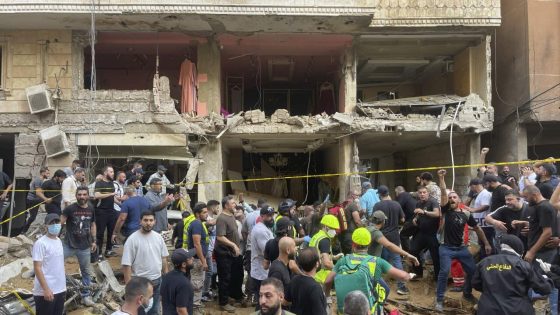Key Points
- An Israeli airstrike on the Lebanese capital of Beirut has killed 45 people, Lebanon’s health ministry said.
- The Israeli military said it targeted senior Hezbollah commanders, with the group later confirming their deaths.
- The strike comes after days of attacks in Lebanon in which pagers and walkie-talkies exploded, killing dozens.
The death toll from an Israeli airstrike on a Beirut suburb that killed a top Hezbollah commander and other senior figures has risen to 45, Lebanon’s health minister says.
The strike hit Beirut on Saturday, and the health ministry initially put the number of those killed at 14. On Sunday, it said 45 people had been killed in the blast.
Health minister Firass Abiad had earlier told reporters 68 people were also wounded of whom 15 remain in hospital.
Three children were among those killed in the deadliest Israeli airstrike on Beirut since the summer 2006 Israel-Hezbollah war.
Hezbollah said the dead included 16 of its members, including senior leader Ibrahim Aqil and another top commander, Ahmed Wahbi.
The militant group called the strike a “treacherous Israeli assassination”.
A security source said at least six other Hezbollah commanders died when multiple missiles slammed into the opening of a building’s garage. The explosion tore into the building’s lower levels as Aqil met other commanders inside.
Witnesses reported hearing a loud whistling and several consecutive blasts at the time of the strike.
Local broadcasters showed groups of people gathered near the site and reported they were searching for people who had been in the vicinity and were still missing, most of them children.
Drones were still flying over Beirut’s southern suburb hours after the strike.
A security source said the attack was carried out with missiles that blasted into the opening of a building’s garage. Source: AAP / Bilal Hussein/AP
In a brief statement carried by Israeli media, Israeli Prime Minister Benjamin Netanyahu said Israel’s goals were clear and its actions spoke for themselves.
Israeli defence minister Yoav Gallant, who has said this week that Israel is launching a new phase of war on the northern border, posted on X: “The sequence of actions in the new phase will continue until our goal is achieved: the safe return of the residents of the north to their homes.”
Hezbollah returns fire
The strike inflicted another blow on Hezbollah after two days of attacks on the group in which , killing 39 people and wounding thousands.
Those attacks were widely believed to have been carried out by Israel, which has neither confirmed nor denied its involvement.
On Thursday night, the Israeli military carried out its most intensive airstrikes in southern Lebanon since the conflict erupted almost a year ago.
The strike marked the second time in less than two months that Israel has targeted a leading Hezbollah military commander in Beirut. In July, an , the group’s top military commander.
The Israeli military reported warning sirens in northern Israel following the recent Beirut strike, and Israeli media reported heavy rocket fire there.
Hezbollah said it twice fired Katyusha rockets at what it described as the main intelligence headquarters in northern Israel “which is responsible for assassinations”.
Tens of thousands of people have fled from homes on both sides of the Israel-Lebanon border since Hezbollah began rocketing Israel in what it says is sympathy with the Palestinians in parallel to the war in the Gaza Strip.
Israel, which last fought an all-out war against Hezbollah 18 years ago, has said it will use force if necessary to ensure its citizens can return.
Israel defends killing of Aqil, UN calls for diplomatic solution
The Israeli military said Aqil had been head of Hezbollah operations since 2004 and was responsible for a plan to launch a raid on northern Israel, similar to the Hamas-led attack on southern Israel on 7 October that triggered the war in Gaza.
Hamas-led militants killed some 1,200 people during the group’s October 7 attack on Israel, taking around 250 hostages. The Israeli military’s retaliatory assault on Gaza has killed more than 41,000 people, according to the enclave’s health ministry.
“The Hezbollah commanders we eliminated today had been planning their ‘October 7th’ on the northern border for years,” Israeli army chief General Herzi Halevi said.
“We reached them, and we will reach anyone who threatens the security of Israel’s citizens.”
People gather in front of a damaged building after the strike in Beirut. Source: AAP / Wael Hamzeh/EPA
The United Nations special coordinator for Lebanon Jeanine-Hennis Plasschaert said Friday’s strike in a densely populated area of Beirut’s southern suburbs was part of “an extremely dangerous cycle of violence with devastating consequences”.
“This must stop now. A diplomatic way out is still possible,” she said.
Aqil had a $US7 million ($10.2 million) bounty on his head from the United States over his link to the deadly bombing of Marines in Lebanon in 1983, according to the US State Department website.
White House national security spokesperson John Kirby said he was not aware of any Israeli notification to the United States before the Beirut strike, adding Americans were strongly urged not to travel to Lebanon, or to leave if they were there.
However, he added that “war is not inevitable … and we’re going to continue to do everything we can to try to prevent it”.



